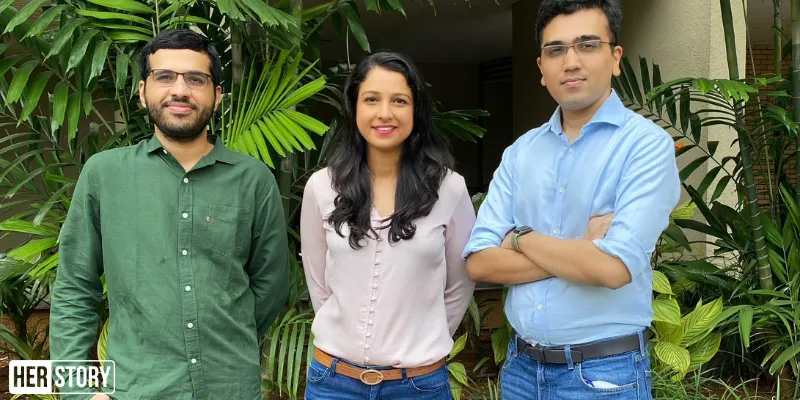This woman entrepreneur’s startup is using technology to disrupt how you invest money in the stock market
Upside AI, founded by Kanika Agarrwal, Atanuu Agarrwal and Nikhil Hooda, is one of the first funds in India to use ML to make fundamental investing decisions. It uses technology to understand, recognise and buy companies that are not only fundamentally good businesses but are also in-demand stocks.
Hailing from a family of entrepreneurs, it was a given that Kanika Agarrwal would also take the entrepreneurial route one day.
“My father is Marwari, and my mother is Gujarati, so one would argue I was born to invest in the stock market,” she says with a laugh.
A chartered accountant, a CFA charter holder, and a Commerce graduate from the University of Mumbai, Kanika has over 11 years of experience in financing and investing, having worked with companies including Mayfield India, Credit Suisse, and EY.
Also after a few years of working her way up the corporate ladder, at the age of 29, when she felt she had the right amount of experience, Kanika started working on building something of her own. And that’s how Upside AI was born.

Nikhil Hooda, Kanika Agarrwal and Atanuu Agarrwal - founders of Upside AI
“My co-founders (Nikhil Hooda and Atanuu Agarrwal) and I realised that the process of investing around the world is evolving with the help of technology. Today, the top five funds in the world are managed and built on technology; 60-70 percent of the money in the US market is run using tech. We could see tech-based investing becoming the norm, not the exception, and it was time India also became a part of that change. While tech plays a small role in the ecosystem in India, e.g. for high-frequency trading or technical trading, we knew that it could do so much more,” Kanika explains.
Nikhil, Atanuu, and Kanika have known each other for the entirety of their professional lives. While Atanuu and Nikhil were batch mates in college, Kanika met them when the three worked at Credit Suisse. Along with being her co-founder, Atanuu also is Kanika’s husband.
Nikhil holds a BTech degree and a PhD in Computer Science from IIT Bombay. In fact, every single code for Upside AI has been written by him.
Atanuu, who looks after product development, has a BTech and MTech in Materials Science from IIT Bombay, and comes with extensive experience in public and private investing both in India and the US.
Tech for investments
Mumbai-based Upside AI was started with a belief that technology should be at the core of fundamental investing decisions.
“We believe that technology will make better decisions than humans over the long-term since machines are unbiased and unemotional decision-makers. We aim to eliminate the involvement of any emotion in the investment process,” she adds.
Also, Kanika and Atanuu had been investing throughout their careers, and looking at this area was almost instinctive. Before they started Upside AI, they ideated across different sectors of financial services. They saw a number of startups were trying to use tech to solve different areas of it, be it lending, insurance, broking, payments, etc.
However, asset management hasn’t changed in the country in 20 years and seemed like a great blue ocean to tackle. They began the process of building Upside AI in 2017, and had a product ready in a year. After a year of testing, they released it in 2019.
“What we do is simple — we feed P&L, balance sheet, and cash flow data for each company into the machine. Our algorithms teach themselves to understand companies that are not only fundamentally good businesses but are also in-demand stocks. At the end of its analysis, it gives us a breakdown of what sectors, as well as companies we should be investing in. We then manually check each company suggested for corporate governance and management integrity because the whole idea is to invest in fundamentally good companies to buy and hold,” says Kanika.
Making customers’ money grow
In the beginning, the founders’ strategy was to first build the product, test it out, and eventually, see if customers would trust them with their money.
Upside AI has two aspects to its business. The first one is Portfolio Management Services or PMS, which caters to HNIs, institutions, and family offices in India and globally. This side of the business largely looks after Rs 50 lakh plus ticket sizes. Here, clients give them the money, it sits with them, they buy shares, handle them, report to them, but they are in control of the investments.
The other part of the business is the retail advisory vertical. Through a partnership with Smallcase, portfolios of stocks or ETFs created by India's top financial experts, Upside AI has introduced best-in-class investment technology to consumers who can invest as little as Rs 30,000-Rs 40,000, or even do SIPs of lower amounts.
Kanika says the response has been incredible. As of September 30, 2020, Upside AI has delivered 24 percent net of fees to its investors, while the index NIFTY 500 delivered one percent. The founder claims that the company is in the top 10 percent of all fund managers on an external database driven by PMS AIF World, i.e. Upside AI is in the top 10 percent of managers out of 150 PMS schemes tracked.
As a result, it has grown its Assets Under Management (AUM) 5X over the same period. Its client base has steadily increased and includes large family offices, VC fund managers, brokers, and C-Suite managers of large MNCs in India and the US.
“We are completely bootstrapped at the moment. SEBI requires you to have Rs 2 crore as minimum net worth in the PMS. We are a part of those few who have managed to cobble that together from friends and family. Our AUM is currently Rs 20 crore and we are doubling every two months. Our business model is a percentage of the money we manage for our investors. Typically, it is some amount of fixed percentage fee per year and a percentage of profit share based on how well we do for them,” she says.
Kanika also says they have a first-mover advantage at the moment as there are no large scale businesses trying to incorporate what they do at Upside AI.
According to her, their biggest success, however, has been how they have thrived during COVID-19.
“Our biggest learning during these times is to never deviate from Standard Operating Procedure. Given that we are a rules-based investor, we always planned to buy a portfolio mid-March. Therefore, even as the markets were in free-fall, we continued to invest in the market because that was what the model dictated,” she says.
This rules-based approach has paid off handsomely – Upside AI added three to four large distributors, about four large family offices, and has grown its AUM by 5X this year.
Kanika has some solid words of advice for women entrepreneurs.
“Be confident and own your seat at the table. A man in your same role would be twice as confident at 80 percent of the smarts. So, the issue is with our self-belief and ability to ask for what we want,” she adds.
Edited by Saheli Sen Gupta










